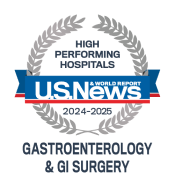Barrett's Esophagus and Esophageal Cancer
Barrett's esophagus does not cause symptoms itself and is important only because it seems to precede the development of a particular kind of cancer esophageal adenocarcinoma. The risk of developing adenocarcinoma is 30 to 125 times higher in people who have Barrett's esophagus than in people who do not. This type of cancer is increasing rapidly in white men. This increase may be related to the rise in obesity and GERD.
For people who have Barrett's esophagus, the risk of getting cancer of the esophagus is small: less than 1 percent (0.4 percent to 0.5 percent) per year. The overall lifetime risk is estimated to be 5percent. Compare this to the lifetime risk of colon cancer in all individuals 5-6 percent, or breast cancer in women 12 percent. Esophageal adenocarcinoma may not be curable, partly because the disease is frequently discovered at a late stage and because treatments are not always effective.
UMMC is a Pioneer in Treating Barrett's Esophagus
UMMC gastroenterologists have 15 years of experience in treating Barrett's esophagus and see a large volume of patients with this problem.
They work together with a multidisciplinary team of physicians--including thoracic surgeons, medical and radiation oncologists, and pathologists-- to treat complicated cases.
In addition, the University of Maryland Medical Center was one of the first sites to pioneer endoscopic CryoSpray ablation, a technique that uses low pressure liquid nitrogen spray delivered through an upper endoscope to destroy abnormal esophageal tissue. The medical center remains a leading site for this technique for the treatment of Barrett's esophagus with high-grade dysplasia, early esophageal cancer, and other precancerous conditions of the esophagus.
Key Points
- In Barrett's esophagus, the cells lining the esophagus change and become similar to the cells lining the intestine.
- Barrett's esophagus is associated with gastroesophageal reflux disease or GERD.
- A small number of people with Barrett's esophagus may develop esophageal cancer. The lifetime risk is comparable to the risk of developing colon cancer - approximately 5 percent.
- Barrett's esophagus is diagnosed by upper gastrointestinal endoscopy and biopsy.
- People who have Barrett's esophagus should have periodic esophageal examinations by EGD (upper endoscopy).
- Taking acid-blocking drugs for GERD may result in improvements in Barrett's esophagus.
- Specific treatment is recommended only for people who have a high risk of developing cancer or who already have it. Options include surgical removal of the esophagus or destruction of the abnormal Barrett's tissue at upper endoscopy (EGD).
For patient inquiries, call 1-800-492-5538 or If you prefer, you may call the division directly at 410-328-5780.

